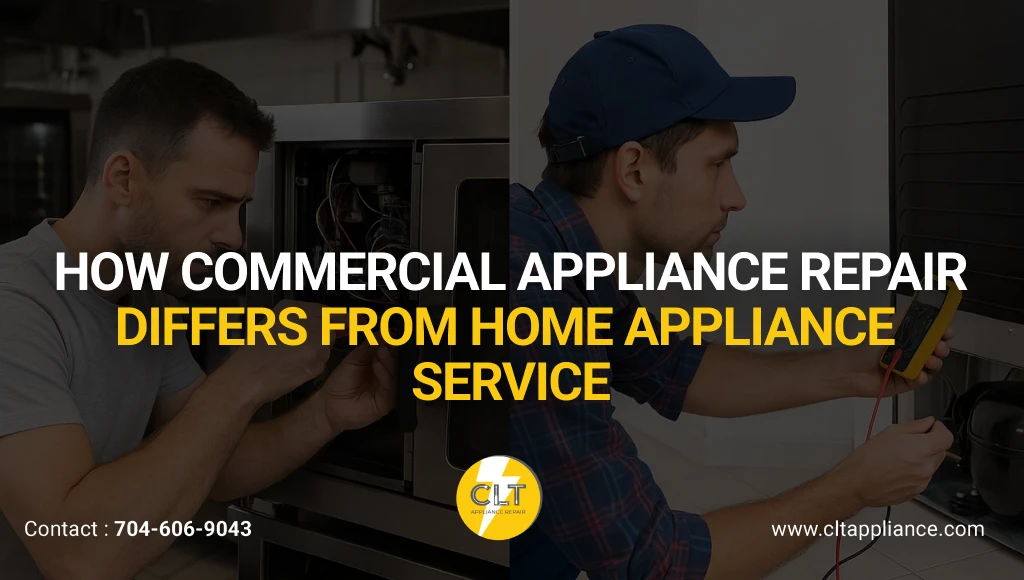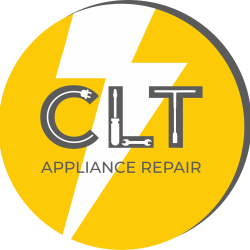[TL;DR]
“Commercial appliance repair differs significantly from home appliance service in complexity, urgency, and expertise requirements.
- Commercial appliances handle continuous heavy-duty use, require specialized technicians with advanced certifications, and demand rapid response to prevent business losses.
- Home appliances need general maintenance, operate intermittently, and allow flexible repair scheduling.
Understanding these differences helps business owners and homeowners choose appropriate service providers and maintenance strategies.”
Appliance repair services vary dramatically between commercial and residential settings, with each requiring specialized expertise, tools, and approaches. Commercial equipment operates under intense daily pressure while home appliance service addresses occasional use and routine maintenance needs.
The key distinctions between commercial and residential appliance repair impact everything from response times and technician qualifications to costs and maintenance strategies. The wrong choice can result in inadequate repairs, safety hazards, and unexpected costs.
Need expert appliance repair but unsure about commercial versus residential service? Our certified specialists at CLT Appliance Repair instantly assess your needs and provide the exact expertise your equipment demands – saving you time, money, and frustration!
Book Your Service: 704-606-9043
8 Key Differences Between Commercial and Home Appliance Repair
Commercial and home appliance services differ fundamentally in equipment complexity, usage patterns, repair urgency, and required expertise levels. These differences determine appropriate service approaches and technician qualifications.
1. Usage and Workload
Commercial appliances operate continuously under heavy-duty conditions in business environments where downtime directly impacts revenue and operations. These units run 12-16 hours daily, handling significantly higher volumes than residential equipment.
Home appliance service addresses equipment used intermittently for household tasks with much lighter operational demands. Residential appliances typically operate 2-4 hours daily with regular rest periods between uses.
2. Size and Capacity
Commercial appliances feature larger capacities and industrial-grade construction designed for high-volume operations and extended durability under demanding conditions. For example:
- Commercial refrigeration units may hold 20-50 cubic feet compared to home units, averaging 15-25 cubic feet.
- Commercial dishwashers process 100+ place settings hourly while home units handle 12-16 place settings per cycle.
Home appliance service deals with smaller, household-sized equipment built for everyday family needs rather than commercial volume requirements. Residential units prioritize energy efficiency and space conservation over maximum capacity.
3. Technician Qualifications and Certifications
Commercial appliance technicians require specialized licenses, brand-specific certifications, and advanced training in industrial systems, electrical work, and safety regulations.
Qualification requirements include:
- EPA certifications for refrigerant handling
- Electrical licenses for high-voltage systems
- Manufacturer-specific training programs
- Commercial safety compliance knowledge
- Industrial diagnostic equipment expertise
In contrast, home appliance repair technicians need general certifications and broader skill sets covering multiple appliance types but with less specialized depth required for each system.
4. Repair Complexity and Diagnostic Tools
Commercial repairs require advanced diagnostic equipment, proprietary tools, and expertise in complex integrated systems that control multiple functions simultaneously. Commercial diagnostic requirements include computerized testing equipment, specialized meters for high-voltage systems, and manufacturer-specific software for system analysis.
Home appliance service typically uses simpler diagnostic tools and standard repair equipment that covers multiple appliance brands and types. Most residential repairs involve straightforward component replacement or adjustment procedures.
5. Response Time and Urgency
Commercial appliance failures demand immediate response because equipment downtime directly impacts business revenue, customer service, and operational efficiency. Emergency commercial service typically provides 1-2 hour response times during business hours with 24/7 availability for critical systems. Delayed repairs can cost businesses hundreds or thousands of dollars in lost revenue daily.
Home appliance repair service allows more flexible scheduling since residential failures create inconvenience rather than immediate financial losses. Same-day or next-day service usually meets homeowners’ needs adequately.
6. Parts Availability and Replacement
Commercial appliance parts often require special ordering from manufacturers due to specialized components and lower production volumes compared to residential parts.
Commercial parts challenges include:
- Longer lead times (3-14 days vs. same-day for home parts)
- Higher costs due to specialized manufacturing
- Limited local inventory availability
- Manufacturer-specific components with no universal alternatives
- Bulk ordering requirements for some components
Home appliance service benefits from readily available, standardized parts that fit multiple appliance models and brands. Most residential parts are available same-day or next-day from local suppliers.
7. Cost Differences
Commercial appliance repairs cost significantly more due to specialized labor, complex diagnostics, emergency response requirements, and expensive replacement parts. They involve labor rates ranging $100-$200 hourly due to advanced certifications required. Emergency calls include additional charges for rapid response and after-hours service. Additionally, parts cost 2-5 times more than residential equivalents due to specialized manufacturing.
Home appliance repair service typically involves rates ranging $75-$150 hourly with flexible scheduling. Standard diagnostic fees cover basic troubleshooting without emergency premiums. Parts remain affordable through multiple suppliers and competitive pricing. Most repairs avoid specialized certification fees or emergency response charges.
8. Impact of Downtime
Commercial appliance downtime creates immediate revenue loss, operational disruption, and potential health code violations in food service businesses. A failed commercial refrigeration unit in a restaurant can result in thousands of dollars in spoiled inventory plus lost sales during closure.
Home appliance downtime creates inconvenience but rarely results in significant financial losses. Families can typically manage temporary appliance failures through alternative arrangements.
Commercial vs Home Appliance Repair: Quick Comparison
| Aspect | Commercial Repair | Home Appliance Service |
| Operating Hours | 12-16 hours daily | 2-4 hours daily |
| Response Time | 1-2 hours emergency | Same day to next day |
| Technician Training | Specialized certifications | General qualifications |
| Parts Cost | $200-$2,000+ | $50-$500 |
| Labor Rates | $100-$200/hour | $75-$150/hour |
| Downtime Impact | Revenue loss, operations halt | Household inconvenience |
| Equipment Size | Industrial capacity | Household capacity |
| Diagnostic Tools | Advanced, proprietary | Standard, universal |
Best Practices for Maintaining Commercial and Home Appliances
Preventive maintenance requirements differ significantly between commercial and residential settings due to usage intensity, regulatory requirements, and downtime costs.
Scheduled Maintenance Frequency
Commercial appliances require monthly or quarterly professional maintenance, while home appliance repair usually involves annual inspections with routine cleaning between visits.
Commercial maintenance schedules include:
- Weekly cleaning and inspection protocols
- Monthly professional service calls
- Quarterly deep maintenance procedures
- Annual comprehensive system overhauls
- Daily operational checks by staff
Home maintenance focuses on seasonal cleaning, annual professional inspections, and basic user maintenance like filter changes and coil cleaning.
Training and Care Requirements
Commercial staff require training on proper equipment operation, basic troubleshooting, and safety procedures to prevent damage and maintain warranty coverage.
Home appliance service benefits from homeowner education about basic care, like cleaning lint filters, checking door seals, and recognizing early warning signs of problems.
Don’t wait for equipment failure to disrupt your business or home comfort. Our team offers comprehensive maintenance programs that prevent costly breakdowns. Let us help you extend appliance lifespan through professional care!
Safety Considerations in Appliance Repair
Safety requirements differ significantly between commercial and residential repair work due to voltage levels, environmental hazards, and regulatory compliance needs.
Commercial Safety Requirements
Commercial appliance repair involves high-voltage electrical systems, gas lines, and industrial equipment that require specialized safety training and compliance with OSHA regulations.
Technicians must use proper lockout/tagout procedures, wear appropriate protective equipment, and follow workplace safety protocols to prevent injuries and comply with regulations.
Residential Safety Measures
Home appliance repair involves standard safety precautions like electrical disconnection, gas line safety, and proper tool usage to prevent household accidents during repairs.
Homeowners should always hire licensed professionals for major repairs involving electrical or gas connections to ensure safe, code-compliant work.
Bottom Line
Commercial and home appliance service have different specialties requiring appropriate expertise, tools, and approaches for effective repairs. Commercial equipment demands specialized technicians, rapid response, and advanced diagnostic capabilities due to continuous operation and business-critical functions.
CLT Appliance Repair understands that not all appliance problems are created equal. When your home dishwasher acts up, it’s inconvenient. When your restaurant’s commercial unit fails during dinner rush, it’s a crisis that costs real money every minute it stays broken.
Our residential technicians provide the reliable home appliance service your family deserves, while our commercial specialists carry the advanced certifications and emergency response capabilities that keep businesses running. We match our expertise, response time, and service approach to what you actually need.
When your appliances matter too much to trust to amateurs, call CLT Appliance Repair: 704-606-9043
Frequently Asked Questions
What are the main differences between commercial and residential appliance repair?
Commercial repair involves specialized technicians, faster response times, complex diagnostics, and higher costs due to continuous heavy-duty equipment operation. Residential service uses general technicians with flexible scheduling for lighter-use appliances.
Do commercial appliance repair technicians need special licenses or certifications?
Yes, commercial technicians require EPA certifications for refrigerant handling, electrical licenses for high-voltage systems, manufacturer-specific training, and knowledge of commercial safety regulations and compliance standards.
Why do commercial appliance repairs usually take longer than home appliance repairs?
Commercial repairs involve complex diagnostic procedures, specialized parts ordering, advanced system integration, and thorough testing to ensure reliability. Home repairs typically use standard parts and simpler procedures.
How does appliance downtime impact commercial vs. residential settings?
Commercial downtime causes immediate revenue loss, operational disruption, and potential regulatory violations. Residential downtime creates inconvenience but rarely results in significant financial impact or business losses.
Are the tools and parts used in commercial appliance repair different from those used in residential repairs?
Yes, commercial repairs require advanced diagnostic equipment, proprietary tools, and specialized manufacturer-specific parts that cost significantly more than standardized residential components and standard repair tools.
Author

- John Bennett
- John Bennett is a seasoned appliance repair specialist at CLT Appliance Repair, where he brings over a decade of technical expertise and a strong commitment to customer satisfaction. With a background in electrical and mechanical systems, John has built a reputation for reliable, efficient, and honest repair services across a wide range of household appliances-including refrigerators, washing machines, ovens, and more.







